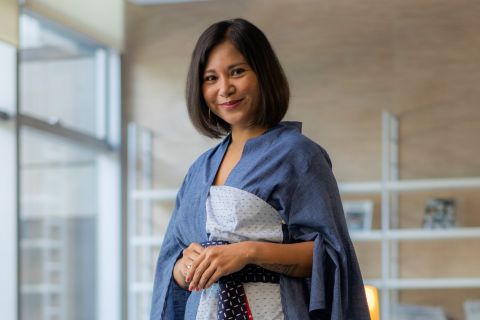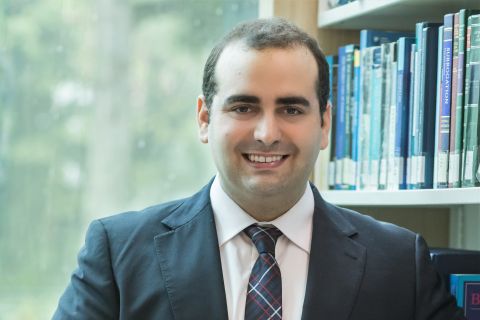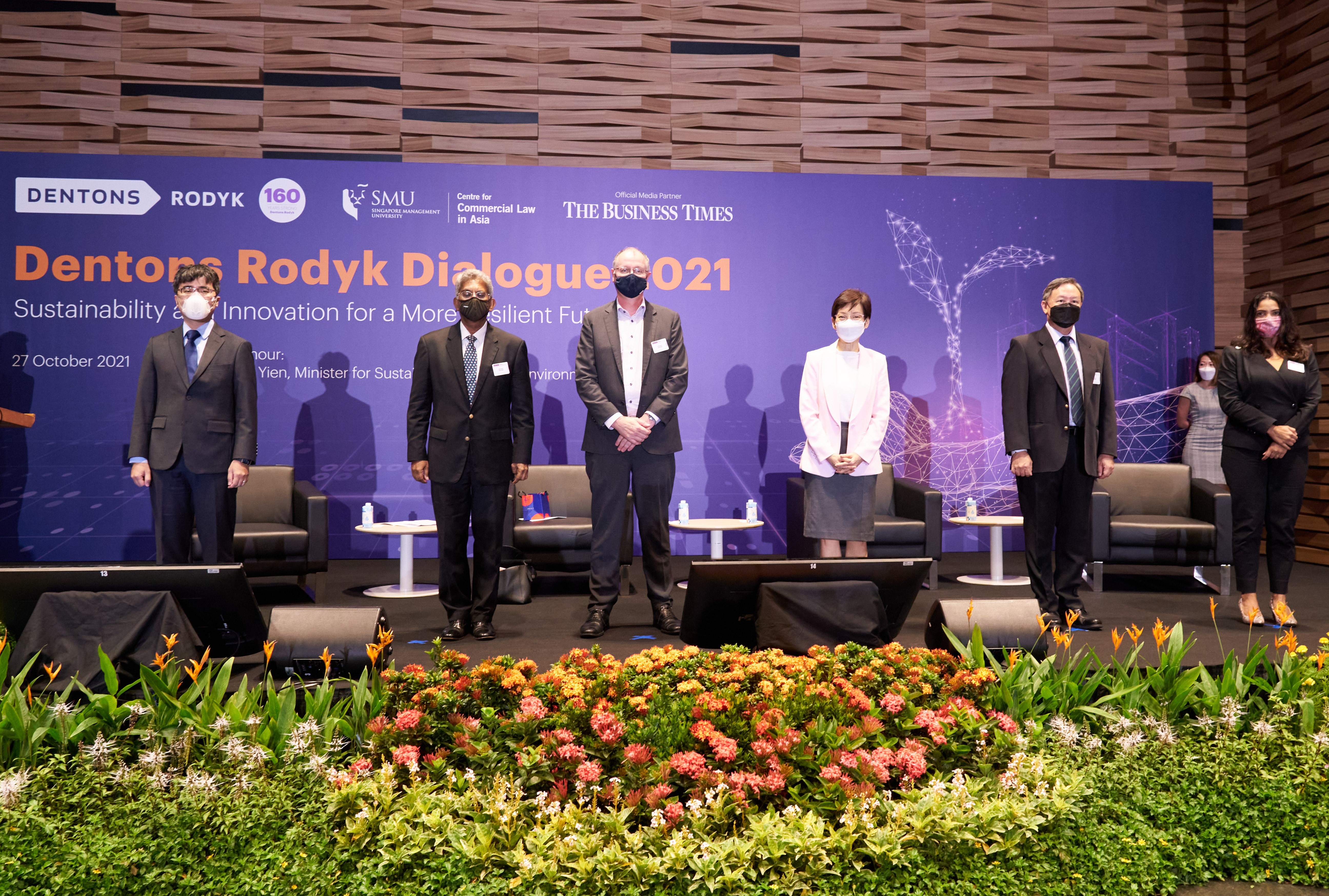
From left to right: Professor Goh Yihan, Dean, Yong Pung How School of Law, SMU; Mr Gerald Singham, Global Vice-Chair & ASEAN CEO, Dentons Rodyk; Professor Timothy Clark, Provost, SMU; Ms Grace Fu, Minister of Sustainability and the Environment; Mr Hugh Lim, Executive Director, Centre for Liveable Cities; Ms Ipshita Chaturvedi, Partner, Dentons Rodyk
By Mitchell Lim
SMU Office of Research & Tech Transfer – SInce its onset, COVID-19 has impacted countries, societies and businesses worldwide. Singapore is no exception. As vaccinated travel lanes reinvigorate tourist attractions and local businesses in the city-state, the road to economic recovery remains fraught with challenges.
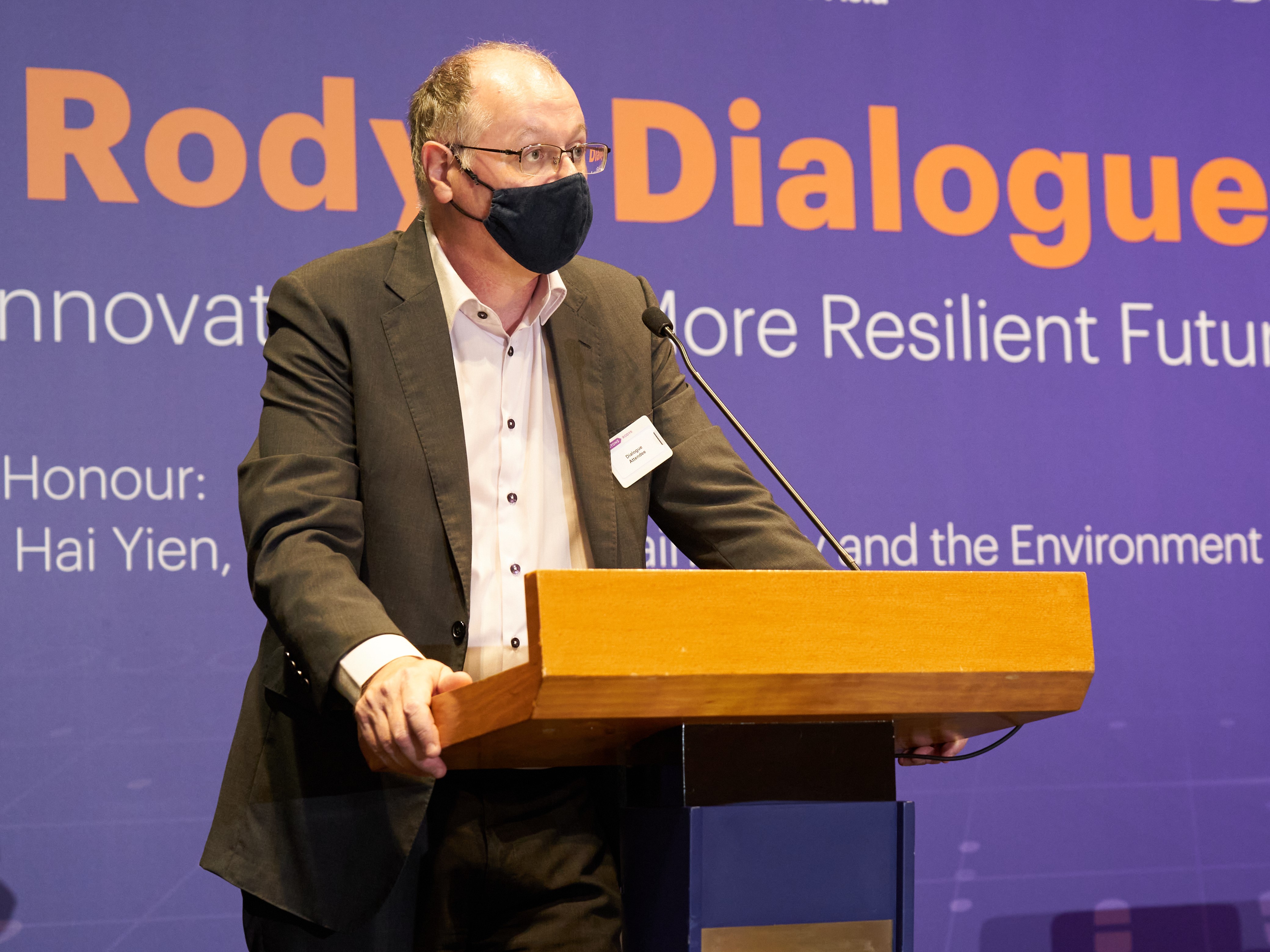
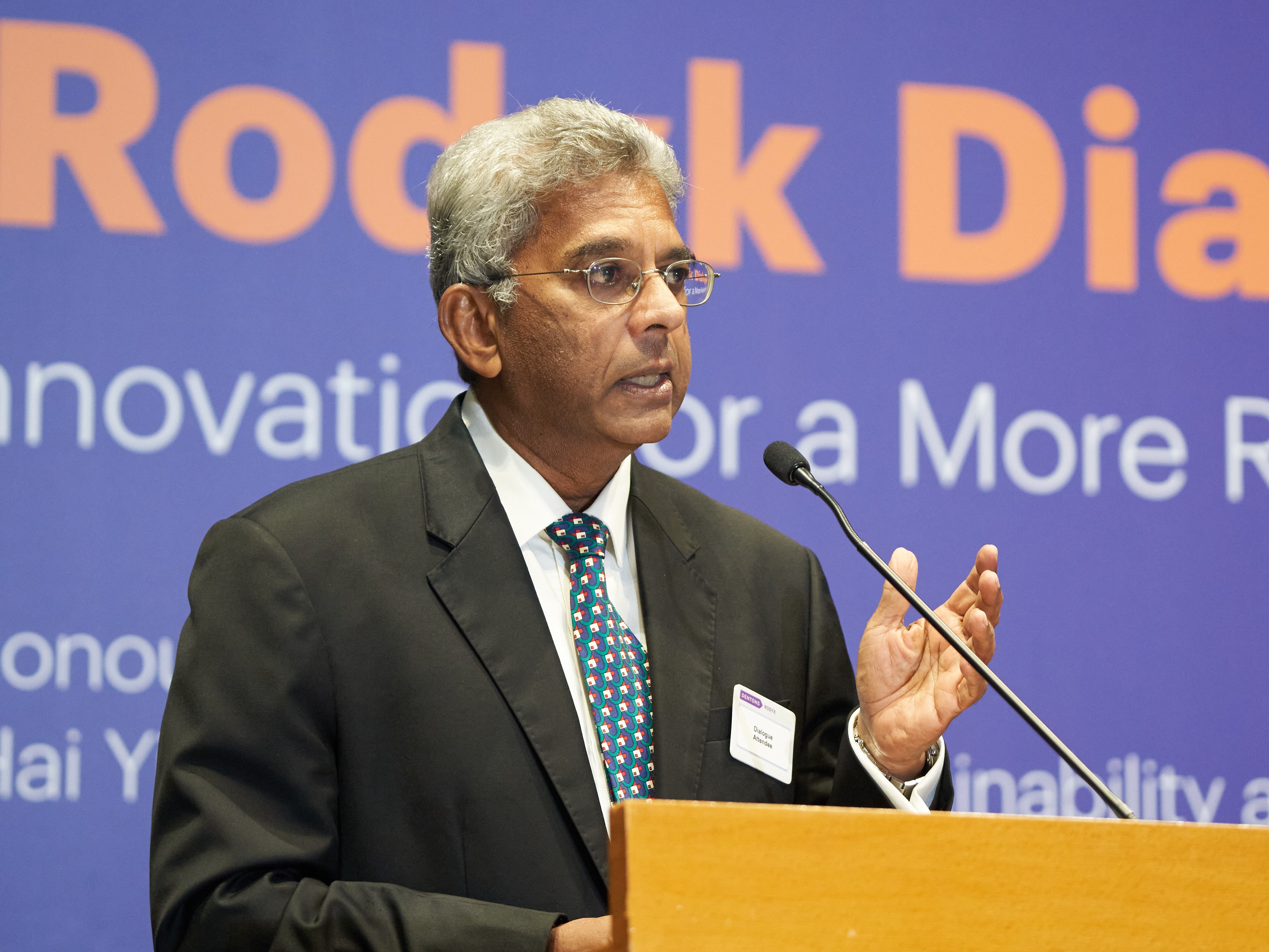
Professor Timothy Clark (left) and Mr Gerald Singham (right) delivering their welcome remarks
In their opening remarks, Mr Gerald Singham, Global Vice-Chair and ASEAN CEO of Singapore law firm Dentons Rodyk and Professor Timothy Clark, Provost of Singapore Management University (SMU) highlighted how sustainability and innovation will be crucial in overcoming these challenges and building an adaptable world for future generations.
“COVID-19 has forced a harsh stress test on governmental systems, societal structures and business models, but from this dark turn comes opportunity,” said Mr Singham. “The ideas and thoughts shared today at the Dialogue will contribute to building a more resilient future,” noted Professor Clark. “At SMU, sustainable living is a key pillar that informs our education and research.”
A partnership between Dentons Rodyk and SMU’s Centre for Commercial Law in Asia (CCLA), the Dentons Rodyk Dialogue held on 27 October 2021 explored how different aspects of sustainability and innovation can be put into action as a strategic response to ongoing crises like the COVID-19 pandemic and even climate change.
Sustainability and innovation starts today
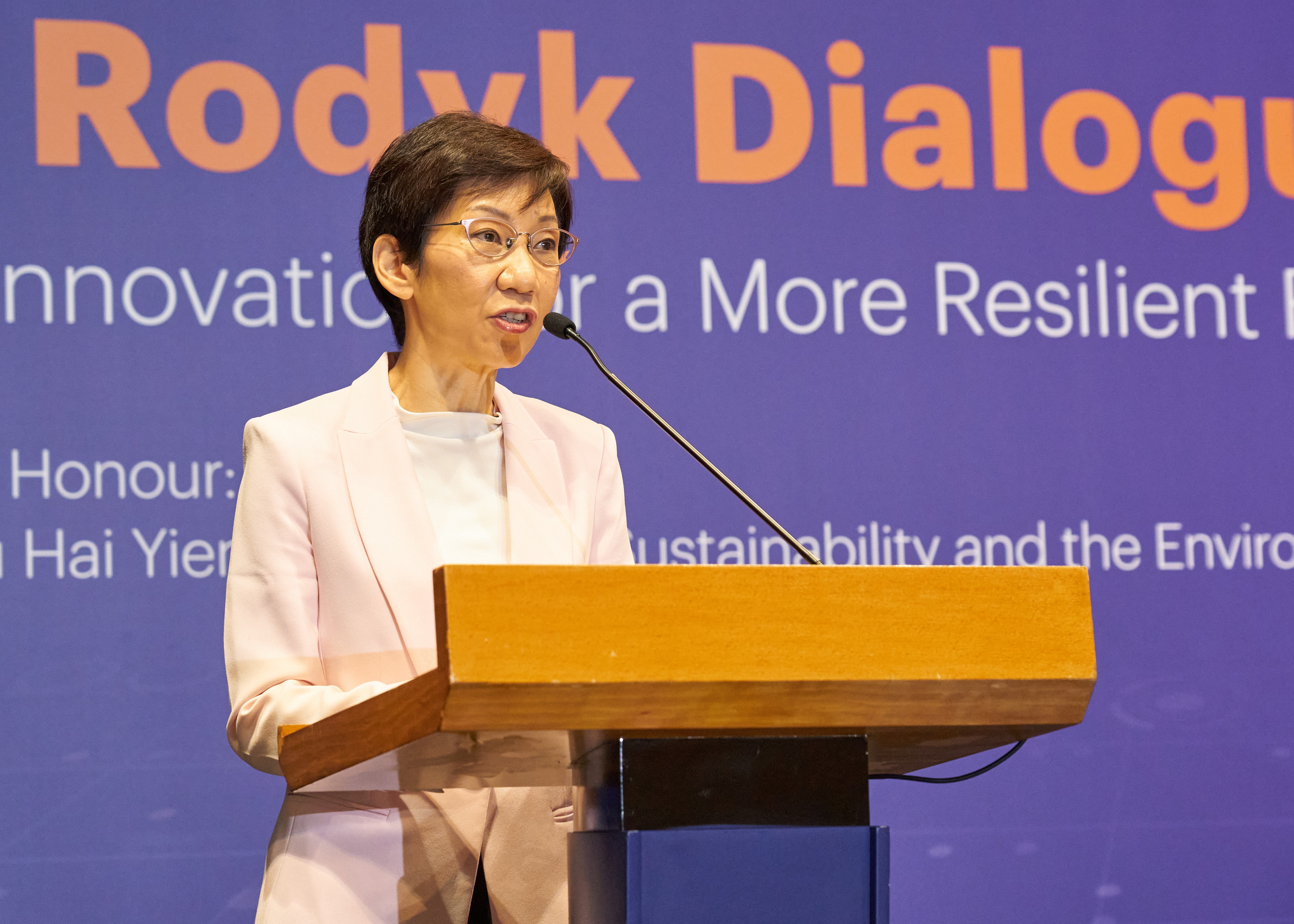
Ms Grace Fu addressing the audience at the Dentons Rodyk Dialogue 2021
Ms Grace Fu, Minister for Sustainability and the Environment, was the guest of honour at this year’s Dialogue. In her address, she emphasised the need to take decisive steps in response to threats like climate change.
“Singapore is particularly vulnerable to sea level rise while extreme weather conditions can also disrupt our supply of essential resources,” said Minister Fu. “[We] must take action to mitigate and adapt to climate change, with sustainability at the core of everything we do.”
Though Singapore’s limited natural resources pose unique challenges in sustainable development, these obstacles can be transformed into opportunities through innovation, noted Minister Fu. “Take our water supplies as an example. We are one of the most water-stressed countries in the world, and yet through investments in technologies over the decades, we are able to recycle every drop and close our water loop,” she said.
In fact, the nation continues to push the frontiers of water recycling, by looking into ways to reduce the process’ energy intensity and carbon emissions. Indeed, a collaboration between PUB, the national water agency, and Sembcorp Floating Solar Singapore has already resulted in one of the world’s largest inland floating solar photovoltaic systems. Located at Tengeh Reservoir, the renewable energy system supplies green energy to treat water, substantially reducing the associated carbon footprint.
According to Minister Fu, the successful enterprises of tomorrow will be distinguished by their ability to operate and produce sustainably. “The effects of climate change demand that we embed sustainability into our DNA to ensure that we can thrive in the future,” she concluded.
Investing for sustainable impact
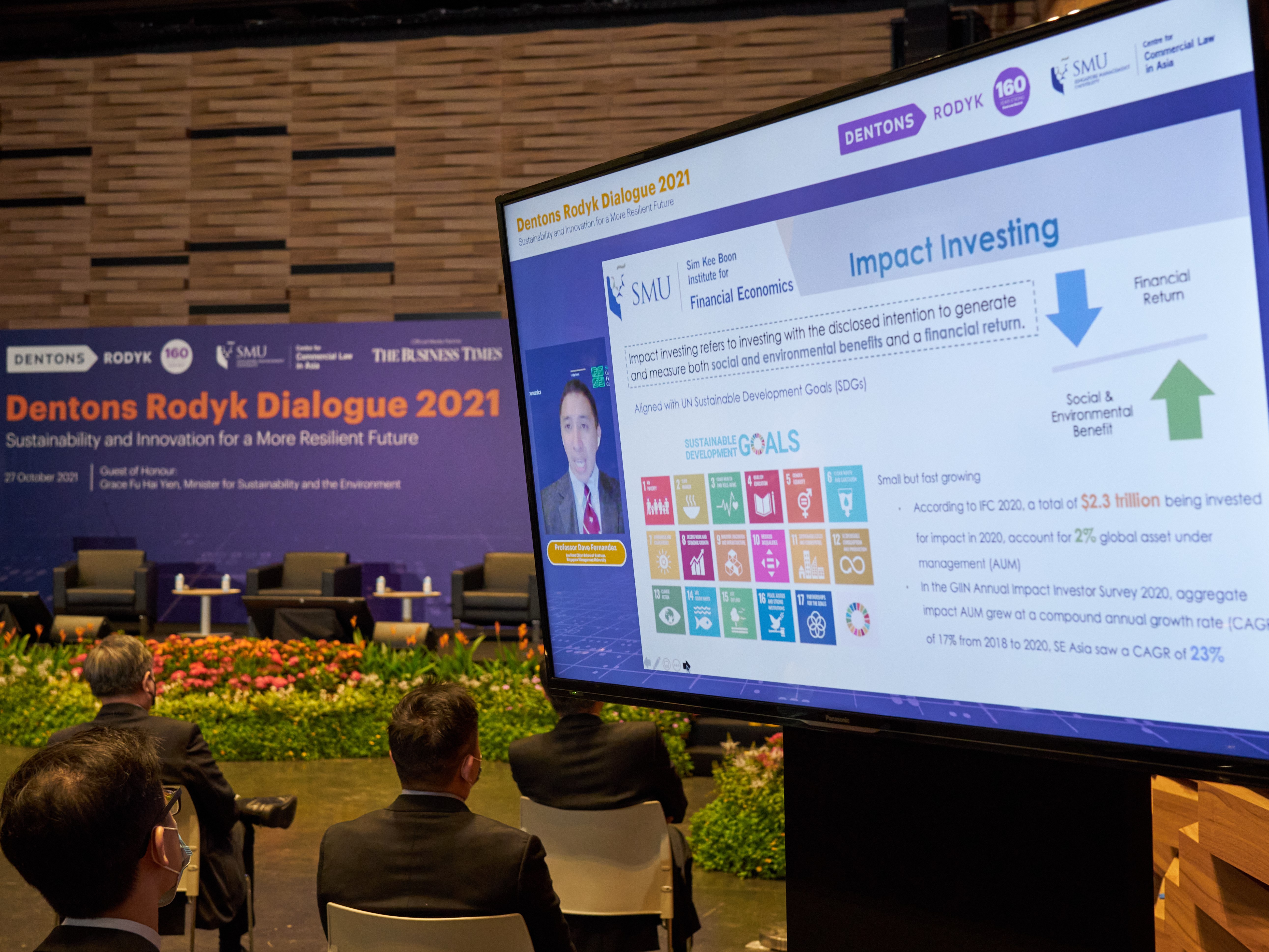
Professor Dave Fernandez gave a virtual presentation on “Sustainability Measurement and Standards: Academic and Practical Perspectives”
Sustainability efforts can also come in the form of investing into new technologies for a low-carbon economy. “Impact investing is growing rapidly, channeling capital to address the world’s most pressing social and environmental challenges,” said Professor Dave Fernandez from the Lee Kong Chian School of Business, SMU, in a presentation detailing academic and practical perspectives on sustainability measurement and standards.
Nowadays, investors are especially interested in knowing if their funds will be utilised for societal good—and companies are taking note. Accordingly, environmental, social and governance (ESG) ratings are commonly used to evaluate an organisation’s focus and direction in practicing sustainability.
While ESG ratings inform financial market investors about a project’s sustainability outlook, it has its shortcomings too. “A fundamental problem of ESG ratings is how arbitrary and unstandardised their inputs and methodologies are, which can lead to substantial divergences in ratings within a single agency,” explained Professor Fernandez.
In search of a way forward, SMU and the Singapore Green Finance Centre are striving to develop a more consistent and complete ‘Impact Measurement’ framework. Instead of solely measuring the input or output of a firm’s activities, the framework quantifies and compares social and environmental impacts, translating them to comparable units that investors can understand.
“Metrics can and should be improved by setting a consistent set of global norms,” reiterated Professor Fernandez. “As government interventions and regulations, local initiatives can be crucial for achieving a better, measured, sustainable future.”
Climate action across the board
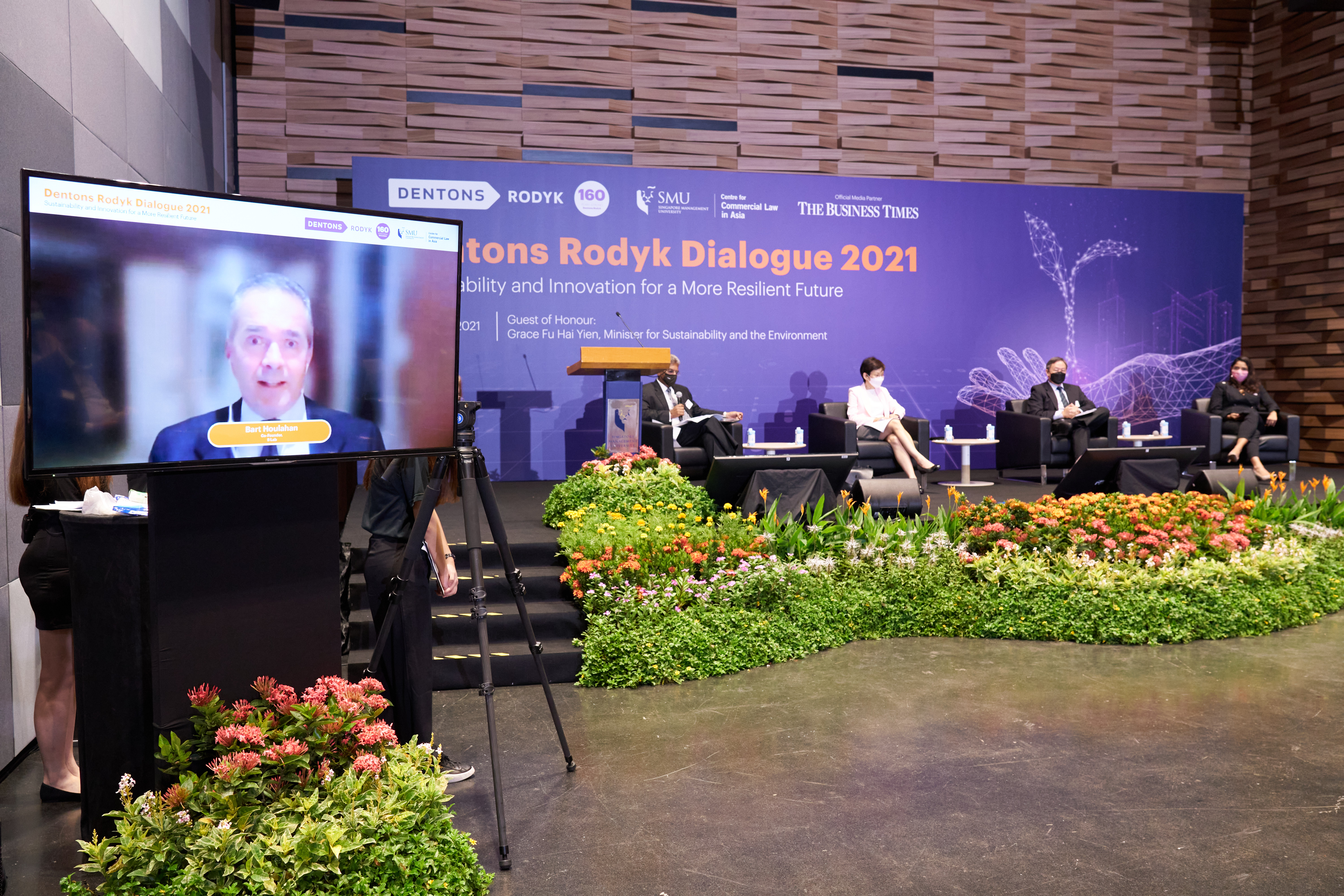
Panel discussion on “Sustainability Goals and Economic Growth: Strategy, Empowerment and Innovation” featuring (left to right) Mr Bart Houlahan, Co-Founder, B Lab, Mr Gerald Singham (moderator), Ms Grace Fu, Mr Hugh Lim, and Ms Ipshita Chaturvedi, Partner at Dentons Rodyk
In a subsequent panel discussion tackling the strategy behind sustainability goals and economic growth, Minister Fu also highlighted how climate change is a global challenge requiring collective effort. Accordingly, collaboration between governments is crucial. Synergising and leveraging the advantages and competitiveness of ASEAN member states could facilitate rapid innovation to make a sustainable future possible.
But action isn’t only limited to governments or large corporations. Each individual, with their unique expertise, can also contribute to sustainability initiatives. Take panellist Ms Ipshita Chaturvedi, Partner at Dentons Rodyk. “In a nutshell, [we] bridge the gap between the public and private sectors and translate regulations into legal practice, which helps businesses transform their current processes to become more sustainable,” she said.
Action will also be driven by the market, noted Mr Hugh Lim, Executive Director at the Centre for Liveable Cities. “Consumer voices will be very important. More buyers of homes and occupants of buildings will say, ‘I want a green building,’ and developers have to respond to that,” he said.
Looking forward to the future, the younger generation will also have a part to play in the whole-of-planet movement towards sustainability. “They’re driving the sustainability movement to a large degree. They're demanding more from what they buy, where they invest their capital and most importantly, where they work,” commented Mr Bart Houlahan, Co-Founder of non-profit organisation B Lab.
As the world cautiously begins to move forward from COVID-19, the discussions at the Dentons Rodyk Dialogue 2021 make it clear that it is high time to face future challenges through sustainability and innovation. “We should get our hands dirty and get on with doing the real work,” noted Minister Fu.
Back to Research@SMU Nov 2021 Issue
See More News
Want to see more of SMU Research?
Sign up for Research@SMU e-newslettter to know more about our research and research-related events!
If you would like to remove yourself from all our mailing list, please visit https://eservices.smu.edu.sg/internet/DNC/Default.aspx
